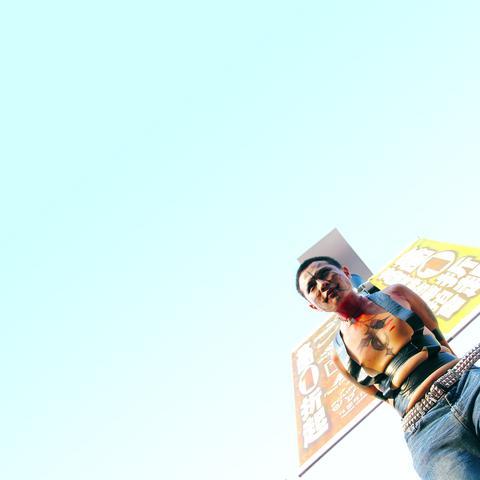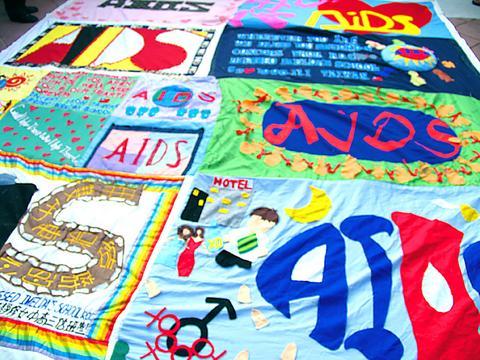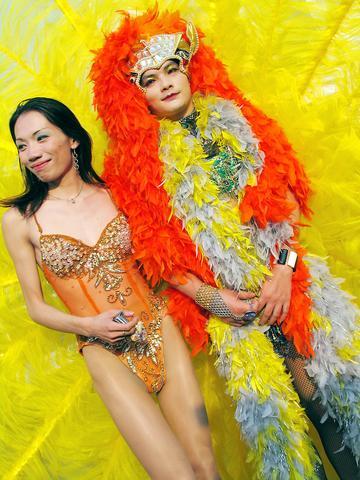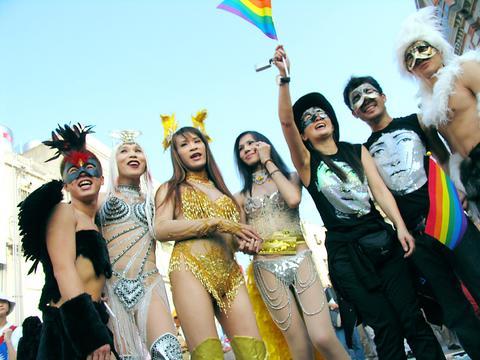Those gathering at Chiang Kai-shek Memorial Hall on Saturday afternoon for the second annual Taiwan Lesbian, Gay, Bisexual, Transgender Pride Parade (台灣同志大遊行) were greeted by admonitions from a Christian group warning homosexuals, "If you do not change your sexuality, you will not enter heaven."
Another group of Christians took a more embracing approach, choosing rather to invite parade-goers to Sunday church services. But while the church took a divided stance, Taiwan's homosexual community chose to unite.

PHOTOS: JULES QUARTLY, TAIPEI TIMES
Organizers estimated around 3,000 people turned up to have their voices heard, their presence felt, and -- because it was a parade -- to fill the streets with music, dancing and bacchanalian revelry.

The parade gathered followers, both gay and straight, as it flowed past 228 Park, a well-known homosexual enclave immortalized in novelist Kenneth Pai's (
One female marcher who joined the party said, "I'm not gay, but I came because I have many gay friends and I want to support them."

Parade organizers from the Taiwan Tongzhi Hotline Association (

Despite fears of facing the media cameras, many young gays came out of the proverbial closet in order to support the Parade and their community.
"I know my parents might see me, but I think it is also important for me to be here," said one university student attending the parade.
Excited photographers captured images of a small minority of parade goers dressed in various costumes, including a group dressed as the holy figure Kuan Yin, a group of young men called the Waterboys clad in just Speedos, as well as drag queens wearing costume jewelery and thick layers of make-up.
What most photographers did not capture were images of followers carrying an AIDS quilt, or quiet homosexual couples marching hand-in-hand, some boasting legally unrecognized unions outlasting many heterosexual marriages.
The fact that the parade-goers did not encounter much societal disapprobation, save the Christian saviors and the occasional annoyed motorist, might cast Taiwan as a gay-friendly Shangri La.
However, when the Parade spilled into the courtyard outside Red Playhouse in Ximending, two homosexuals from Kaohsiung testified to the contrary, reporting frequent police harassment and gay arrests on trumped-up charges.
This testimonial from the south both underscored Taipei's unique position as a liberal outpost in Taiwan and also the need for similar gatherings that will further shed light on existing discrimination.
Following the sober reminders, organizers attempted to rally the group into repeating various contrived chants of resistance borrowed from similar protests rallies around the world. It was a call to action that did not quite pass muster with the crowd. However, pop-diva Sandy Chen (
Other public figures, including university professors and Taiwanese starlets, taped messages that were broadcast on the large screen across from the Ximending MRT station.
DJ Victor Cheng, who mixed records and led the parade on a truck with a sound system, summed up this year's Pride Parade thus: "When my friends try to compare this parade to larger events in the US, I remind them that this is how parades in the US got their start ... the turnout this year proves that the parade will continue to become stronger."
Last year, 1,000 people participated and the larger-scale event this year may indeed bode well for the Pride Parade's future in Taiwan, yet one attendee took a more jaded and perhaps more realistic view of Taiwan's state of affairs. "Society doesn't have a problem with gay people in the public sphere, but when gays enter the home, when a gay is in their family, that's where they draw the line."
True enough, unlike similar manifestations in New York, San Francisco, or Sydney, one did not catch a glimpse of parents out to support their gay children. But reaching that level of acceptance might be a long-term project, or at least an aspiration for the next Taiwan Pride Parade.

On April 26, The Lancet published a letter from two doctors at Taichung-based China Medical University Hospital (CMUH) warning that “Taiwan’s Health Care System is on the Brink of Collapse.” The authors said that “Years of policy inaction and mismanagement of resources have led to the National Health Insurance system operating under unsustainable conditions.” The pushback was immediate. Errors in the paper were quickly identified and publicized, to discredit the authors (the hospital apologized). CNA reported that CMUH said the letter described Taiwan in 2021 as having 62 nurses per 10,000 people, when the correct number was 78 nurses per 10,000

As we live longer, our risk of cognitive impairment is increasing. How can we delay the onset of symptoms? Do we have to give up every indulgence or can small changes make a difference? We asked neurologists for tips on how to keep our brains healthy for life. TAKE CARE OF YOUR HEALTH “All of the sensible things that apply to bodily health apply to brain health,” says Suzanne O’Sullivan, a consultant in neurology at the National Hospital for Neurology and Neurosurgery in London, and the author of The Age of Diagnosis. “When you’re 20, you can get away with absolute

May 5 to May 11 What started out as friction between Taiwanese students at Taichung First High School and a Japanese head cook escalated dramatically over the first two weeks of May 1927. It began on April 30 when the cook’s wife knew that lotus starch used in that night’s dinner had rat feces in it, but failed to inform staff until the meal was already prepared. The students believed that her silence was intentional, and filed a complaint. The school’s Japanese administrators sided with the cook’s family, dismissing the students as troublemakers and clamping down on their freedoms — with

As Donald Trump’s executive order in March led to the shuttering of Voice of America (VOA) — the global broadcaster whose roots date back to the fight against Nazi propaganda — he quickly attracted support from figures not used to aligning themselves with any US administration. Trump had ordered the US Agency for Global Media, the federal agency that funds VOA and other groups promoting independent journalism overseas, to be “eliminated to the maximum extent consistent with applicable law.” The decision suddenly halted programming in 49 languages to more than 425 million people. In Moscow, Margarita Simonyan, the hardline editor-in-chief of the